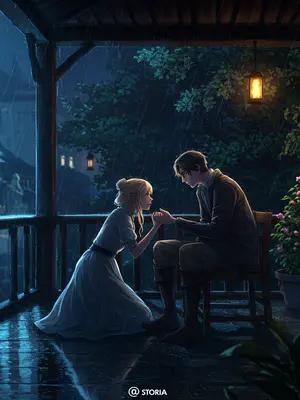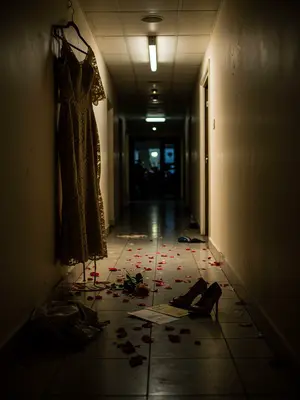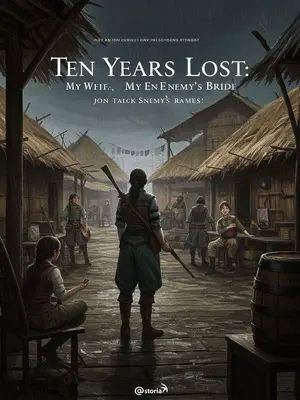Chapter 2: Amaka and Baba Musa
Every day, I would peep through the small hole at the woman next door. Her name was Amaka.
Sometimes breeze go blow, carry Amaka voice reach my side. Her laughter get that ring wey dey make man heart melt—like the type you go hear for church choir before service start. Some days I go see am sit for parlour dey comb her hair, or dey press phone, foot up for plastic stool. The way she dey waka, you go know say she get wetin some men dey call 'fresh spirit.'
Amaka was young, light-skinned—her skin dey shine like those fair girls for Surulere—with a baby face and long, relaxed hair. She looked mature but still had that cute vibe. She didn't have a job, just stayed at home watching Nollywood films or sometimes went out to the market. At home, she dressed anyhow, mostly in pink cartoon pajamas. She fine die—one of those babes you see once and you no go forget.
Anytime I glimpse her face, na so my heart go do kpalasa kpalasa. Her chest stuck like eba when water finish—she no fit move. E be like say her fine get charm, and her smile dey quick shift from shy to bold. The pink pajamas dey always stand out for that dull parlour, as if na she be the only colour wey life remain give. Her Nollywood cassettes dey scatter everywhere. If generator dey run, you go hear old movie lines with Igbo accents: 'My love, you are my only destiny.' The way Amaka dey reply her TV sef dey funny—sometimes she go hiss, sometimes she go laugh so tey I go smile for my own flat.
Her husband, Baba Musa, ran a buka downstairs called Musa's Kitchen. Everybody for the area dey call am Baba Musa. He looked exactly like a chef: square face, low-cut hair, big shoulders, thick waist, always smiling anyhow. The man don pass forty, small oil dey his body, street wise, but him dey hustle. If you stand near am, na stew and fried fish go first hit your nose.
If you see Baba Musa for market, you go first notice the aroma of stew wey dey follow am. The man big, round, but him laugh na the type wey dey make customers come back. Even for heat, him dey wear that dirty white apron with red pepper stain—one kain badge of honour. Area boys dey hail am, 'Baba Musa! Abeg dash us bone!' and he laughs: 'You wan chop bone, you no wan pay? Go find work!' Him sabi everybody for street; if landlord pass, na Baba Musa go hail am first. Even police dey respect am when dem dey buy food. E get as e go bend down dey pack amala, you go see say hustle really build that man body.
Every night by 11:30, Baba Musa go come back, bath, enter bed, and begin do wetin husband and wife dey do, no time to waste. The way he loved Amaka, ehn—no be small. The man dey craze for his wife, the kind way only some men fit craze. For him eyes, every night with Amaka na heaven.
If I close my eye, I fit hear the floorboard creak as Baba Musa dey waka reach room, then quick splash of water for bucket. Sometimes Amaka go yawn loud, like person wey dey wait for food. Once Baba Musa finish, na straight to the matter. The wall dey thin, so even if I no wan hear, I dey hear small whisper, giggle, bed dey shake, then deep silence. E dey obvious say na love dey worry the man. If I peep, I go see Baba Musa dey rub Amaka head like person wey dey thank God say he win lottery.
Me, I dey hide for dark, just three or four meters away. For my eyes, that slim and fine Amaka wey dey with Baba Musa be like chicken wey dey beside hungry wolf.
Sometimes, I go press my face close to the wall, my own room cold as harmattan breeze dey blow. The contrast between me and them just dey loud—dem dey inside warmth, dey enjoy, me I dey here dey dream. My own mattress dey hard; only the street sound and generator hum dey keep me company. Amaka, for my mind, na like better life wey pass my reach. E pain, but e sweet to dey watch too.
Dem go off light sleep, mostly around one in the morning. But me, sleep no dey come. For the quiet, Amaka’s face go just dey my mind. She dey so close—only wall dey separate us. But still, e be like say I no fit ever reach am for my life.
Na so I go roll for bed, count ceiling lines, dey ask myself why Lagos fit hard like this. If I close eye, I go still dey see Amaka smile, dey feel say better thing dey my front, but na only wall fit divide poor man from him dream. Night go long, sleep go refuse come—na only fan go dey blow noise for my head.













